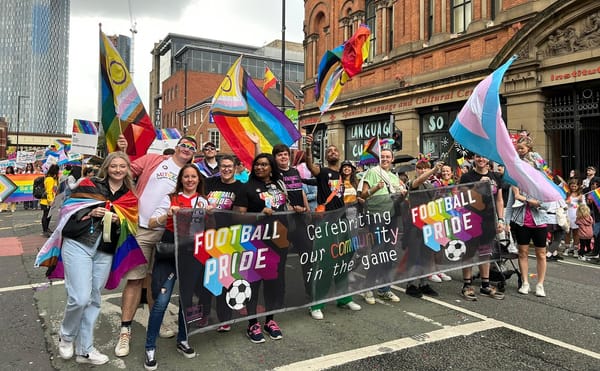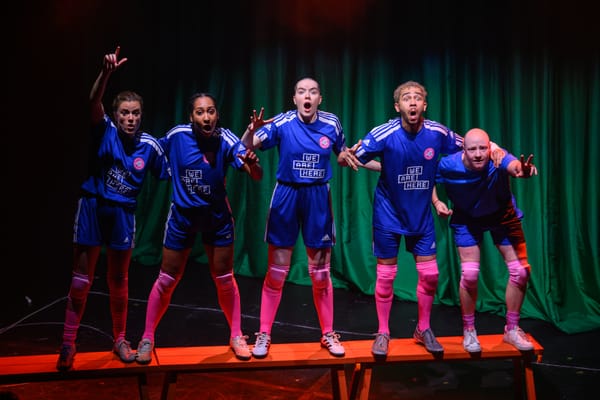What should we expect of footballer allies?
Amid speculation over a move to Saudi Arabia for LGBTQ+ ally Jordan Henderson, what is allyship in football actually worth?
In a desert, a drop of water can seem like an ocean. And after a decades-long drought of support for the queer community from the world of football, when a strong ally comes along it feels like a big step forward.
That’s how it felt with Jordan Henderson. Over many years, the Liverpool captain has built a reputation as a strong LGBTQ+ ally and given his full-throated support to the community.
In 2021, as part of the Rainbow Laces initiative, he said:
“I do believe when you see something that is clearly wrong and makes another human being feel excluded you should stand shoulder-to-shoulder with them. You also have a responsibility to educate yourself better around the challenges they experience.”
“That’s where my own position on homophobia in football is rooted.”
In 2021, he tweeted his support for a queer England fan who had gone to a game wearing makeup for the first time.
His actions have made people who felt isolated from the game want to take part again.
This week, The Athletic reported that Henderson was leaning towards joining Saudi Arabian side Al-Ettifaq, managed by Steven Gerrard. Henderson has reportedly agreed wages of £700,000 a week.
Saudi Arabia is a state that kills, imprisons and lashes queer people for existing. We are illegal there.
Understandably, there’s been a backlash.
Paul Amann, chair of the LGBT+ Liverpool fan group Kop Outs, told The i newspaper:
“Given Jordan’s unswerving previous support to a number of human rights issues from women’s rights and Women In Sport to Rainbow Laces and other LGBT+ campaigns, it’s extraordinary to think that this would sit well with a man who has nailed his colours to the mast so effectively and been an amazing ally over this time,”
“It cannot take away from him being a captain of Liverpool at a point at which we’ve won everything and it can’t take away from his personal statements in the past. But it taints everything. I would say this about any individual, it’s not about Jordan; anybody that chooses to go to play in a regime that is so fundamentally against human rights clearly doesn’t actually hold human rights that close to them.
“If he is genuinely countenancing it, which we don’t know, then that is deeply disappointing and highly concerning that he can perform such a volte-face on this issue and effectively leave us questioning the authenticity of his original support.”
At time of writing, we don’t know whether Henderson will move to Saudi Arabia. There are conflicting reports about how likely the move is. But given Henderson’s clear consideration of the offer, this feels like an apt moment to reflect on what allyship actually means, what we expect of footballers who say they’re allies, and the limitations of relying on allyship for progress.
Allyship is an honourable but flimsy concept. In the context of racism, Queer Eye’s Jonathan Van Ness put it well when he told the Diary of a CEO podcast recently:
“If you’re white, racism doesn’t affect you in the same way as it does if you’re a person of colour. But you shouldn’t just be like ‘I’m gonna do you a solid and be an ally’. You should be in that fight because an injustice anywhere is an injustice everywhere and it will affect you.”
Jonathan’s point is that the whole concept of allyship in society today creates a distance between those that are affected by an issue and those who aren’t. But everyone is affected by any discrimination in some way – of course some groups feel it much more noticeably than others – but Van Ness is right: injustice has often-imperceptible ripple effects that touch all of us. It skews society to be something worse than the best possible version of itself.
Perhaps the Henderson affair has simply acted as a collective moment of realisation that allyship in football – just as in other places – has come to be a badge that people wear, a flag that they wave. After all, what’s the cost of wearing some rainbow laces and saying some well-thought-out words?
A symbolic gesture has value and a place. But it’s only ever going to do so much.
Henderson has tried to articulate that himself. In the same Rainbow Laces article from 2021, he said:
I’ve seen myself described as an ‘ally’ for the community who are striving to feel more included, but to be honest I don’t think that’s an accolade I’ve earned. That isn’t false modesty, it’s me being truthful. Because I don’t feel I’ve done anything out of the ordinary or worthy of it.
At the time, I read this as a humble man normalising support for the LGBTQ+ community. But reading it back, a cynic could read it another way: that Henderson knows that what he’s doing is not altogether that difficult.
We shouldn’t mistake support for gesture-led campaigns like Rainbow Laces for actual sacrifice or true activism. Last year’s OneLove armband debacle showed us how support for the queer community often disintegrates as soon as there’s any risk of real consequences.
Allyship means nothing if your support flakes away as soon as the price is right. And in a game flush with cash, and problematic nation states ever more willing to make it rain, the price will be right more and more.
So what should we ask of our footballers? I think we need them to be honest with us about the limits of gestures like Rainbow Laces. Where footballers want to support the LGBTQ+ community, that support should be practical and tangible.
Take Conor Coady, for instance. He’s lent his support to an initiative called Allies United that will offer diversity workshops to grassroots clubs. And while lending your name to something, providing a quote for a press release and posting a video on Instagram don’t exactly equate to the Stonewall riots, the benefits are clear: Coady’s profile will help raise awareness of the scheme, directly resulting in more clubs signing up
At the same time, we as LGBTQ+ fans need to regain some perspective over the reality of our footballer allies. Their support is welcome, and the benefits of their voices lended to our cause are real. But those benefits are limited and their support is not unconditional.
We shouldn’t forget it.



